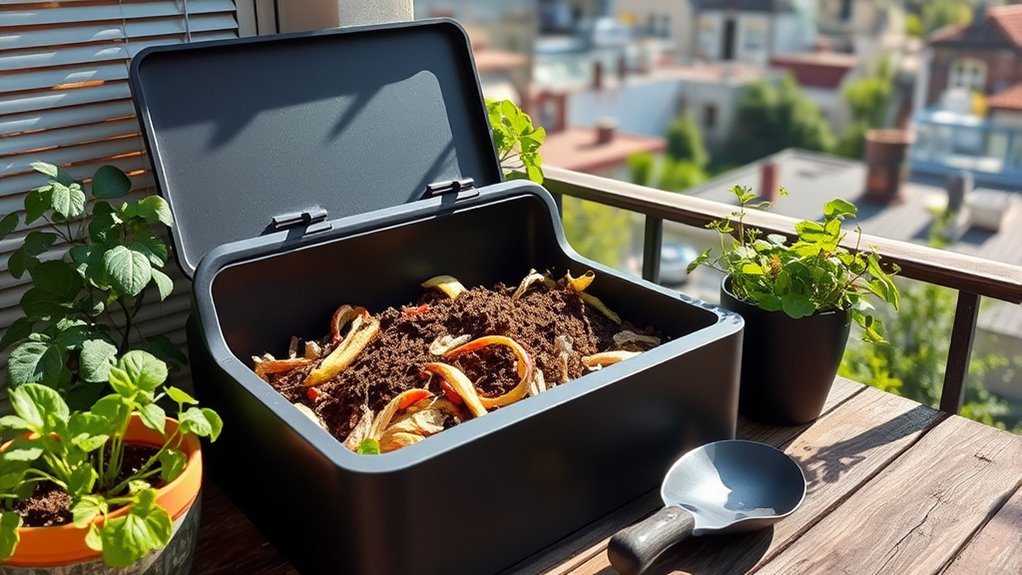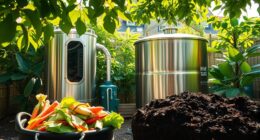If you live in an apartment, composting is totally achievable with a compact, odor-controlled bin designed for small spaces. Use it to turn kitchen scraps like vegetable peels and coffee grounds into nutrient-rich compost. Keep the balance of greens and browns, aerate regularly, and monitor moisture levels to prevent odors and pests. With the right setup and tips, you can transform waste into healthy soil—all while conserving space. Keep exploring to see how you can perfect your urban composting method.
Key Takeaways
- Choose a compact, odor-controlled compost bin suitable for small indoor or balcony spaces.
- Maintain a proper balance of greens and browns, avoiding meat and dairy to prevent pests and odors.
- Regularly aerate the compost and monitor moisture levels to ensure efficient decomposition.
- Cover food scraps with dry materials like paper or leaves to minimize smells and pests.
- Follow best practices from trusted sources, such as proper composting materials, for safe urban composting.

Composting at home is a simple and effective way to reduce waste and create nutrient-rich soil for your garden. Even if you live in an apartment, urban composting makes it possible to enjoy the benefits of composting without needing a yard. The key is choosing the right method and maintaining your compost bin properly. Urban composting typically involves small, odor-controlled bins or containers that fit easily into limited spaces like balconies, patios, or even inside your apartment. These options help you turn kitchen scraps into valuable compost while keeping your living space clean and odor-free.
To get started, select a compact compost bin designed for indoor or small-space use. Many options are available with lids and ventilation systems that control odors and moisture. Once you have your bin, it’s important to understand compost bin maintenance. Regularly aerate the compost by turning it with a small trowel or scoop. This step encourages airflow, prevents odors, and speeds up decomposition. Keep an eye on moisture levels—your compost should feel moist but not soggy. If it gets too wet, add some dry materials like shredded paper or dry leaves to balance the moisture. If it’s too dry, sprinkle a little water to keep things active.
The ingredients you add to your urban compost should be balanced between greens (kitchen scraps like vegetable peels and coffee grounds) and browns (carbon-rich materials like paper, cardboard, or dried leaves). Avoid adding meat, dairy, or oily foods, as these can cause odors and attract pests, especially in an indoor environment. When managing your compost bin, always cover food scraps with a layer of browns to minimize smell and pests. Proper compost bin maintenance means monitoring these layers, turning the contents regularly, and ensuring the environment inside remains healthy for decomposition. Incorporating proper composting materials helps maintain the right balance and promotes efficient breakdown of waste.
Frequently Asked Questions
Can I Compost Pet Waste Safely Indoors?
You probably wonder about pet waste safety when composting indoors. It’s generally not recommended because pet waste can contain harmful pathogens that pose health risks. Many indoor composting myths suggest it’s safe, but it’s better to avoid composting pet waste at home. Instead, dispose of it properly to prevent contamination. Keep your indoor composting safe and healthy by focusing on approved materials like fruit and vegetable scraps.
What Are the Best Odor Control Methods for Small Compost Bins?
To manage odor control in small compost bins, you should focus on proper balance. Add browns like dry leaves or shredded paper to absorb moisture and reduce smell. Turning the compost regularly helps aerate it, preventing odor buildup. Using activated charcoal or compost deodorizer can also help neutralize smells. Keep the lid tightly closed and place the bin in a well-ventilated area to minimize odors while maintaining effective composting in your small bin.
How Long Does It Take for Compost to Be Ready?
You might think composting is instant magic, but the truth is, it’s more like waiting for a good joke to land. The composting timeline varies, but generally, it takes about 3 to 6 months for your compost to reach maturity. Patience is key during the compost maturity period, so keep turning and maintaining your bin, and soon you’ll have nutrient-rich soil ready to boost your garden or plants.
Is Composting Illegal in Any Apartment Complexes?
You might wonder if composting is illegal in your apartment complex. It depends on apartment restrictions and local regulations, which can vary widely. Some complexes have specific rules banning compost bins due to space or odor concerns, while others encourage eco-friendly practices. To stay compliant, check with your property management and review local laws before starting composting. This ensures you compost responsibly without risking violations or fines.
Can I Compost Bread and Dairy Products?
You can compost bread scraps and dairy waste, but you should be cautious. Bread scraps decompose well and can add carbs to your compost, while dairy waste can attract pests and cause odors. To safely compost these items, use a sealed bin or a composting system designed for kitchen scraps. Avoid open compost piles, especially in apartments, to prevent pests and unpleasant smells. Proper management guarantees safe, effective composting.
Conclusion
Now that you’ve mastered composting at home, your apartment will transform into a lush jungle, bursting with vibrant greenery and the sweet aroma of earth’s magic. Your tiny balcony will become a bustling rainforest, teeming with life, all thanks to your eco-friendly efforts. Soon, your neighbors will think you’ve discovered the secret to growing a jungle in a shoebox. Keep going—your composting adventure is turning your space into a tiny paradise, one compost bin at a time!









